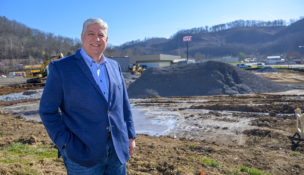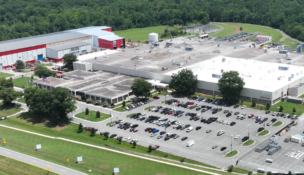Report: Va. data center projects totaled $6.8B in 2021
Centers made up 62% of state economic development announcements
Report: Va. data center projects totaled $6.8B in 2021
Centers made up 62% of state economic development announcements
Data centers are a primary driver of economic growth in Virginia, comprising $6.8 billion or 62% of all major economic investments announced last year by the Virginia Economic Development Partnership, according to a new report released Thursday by the Northern Virginia Technology Council (NVTC).
While the total for 2021 represents a decrease from 2020, when the centers accounted for 81%, or $7.9 billion, in new investments announced by the VEDP, their impact still remains huge. Data centers accounted for as many as 5,550 operational and 10,230 construction and manufacturing jobs, $1.6 billion in employee pay and benefits and $7.5 billion in economic output in 2021, the NVTC report found. And that’s just the direct impact — data centers had an approximate total impact of about 45,460 jobs, $3.6 billion in pay and benefits, $15.3 billion in economic impact and generated about $174 million in revenue for the state and about $1 billion in local tax revenue.
“For every job inside a Virginia data center, there are 4.1 additional jobs that are supported in the rest of the Virginia economy,” states the NVTC’s 2022 Virginia Data Center Report.
Loudoun County‘s “Data Center Alley” in Ashburn has the largest concentration of data centers in the world. In fact, the data center inventory in Northern Virginia exceeds the five largest other markets combined, according to the report. As land in Loudoun becomes more scarce, the county is facing a proposal to rein in their development along the Route 7 corridor as part of a zoning revision.
In Loudoun, the centers currently account for about 26 million square feet with about 5 million more square feet in development, Buddy Rizer, the county’s executive director for economic development said.
Moreover, Virginia’s data centers have led to ancillary economic development, such as the construction of the international subsea high-speed internet cable landing in Virginia Beach, with a new Atlantic seaboard cable planned to connect Virginia with New Jersey, South Carolina and Florida.
Tax revenues from data centers help to offset state expenditures on education, too. In Loudoun County, the centers generated $73 million for education funding; in Prince William, another hotbed for data center development, they accounted for $17.5 million in funds, according to the report. That’s more than $90 million that the state was able to put toward other localities.
“The tax revenue that is generated by a data center is so significant,” Prince William County Department of Economic Development Executive Director Christina Winn told Virginia Business in an interview.
In 2012, data centers accounted for a little more than $5.9 million in tax revenues in Prince William, said Jeff Green, business development manager for the county’s economic development department. By 2021, that increased to nearly $79 million.
Data center growth in Prince William is expected to continue, helped along in part by demands fueled by the COVID-19 pandemic and advances in technology, Winn said. The centers currently account for 33 buildings comprising 5.4 million square feet, and another eight buildings are under construction, Green said. Those are expected to add another 2 t0 3 million square feet.
“I do believe that there’s going to be continued growth in the data center industry, and that is really just in terms of the demand, or the evolution of technology,” Winn said.
Competition for data center investment has “never been tougher,” Rizer said adding, “offering consistency, predictability and a fast time-to-market is more important than ever.”
Legislation passed in the General Assembly’s spring session, which awaits Gov. Glenn Youngkin’s signature, would create a common assessment process for the centers. That’s a “great step forward,” Rizer said.
“The biggest thing that Loudoun and the commonwealth can do to remain competitive is to maintain its predictable tax environment and retain its business-friendly attitude for the industry.”
g

















